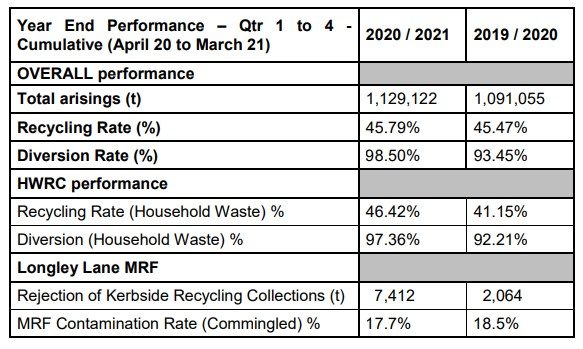The Greater Manchester Combined Authority (GMCA) has warned that introducing a separate weekly food waste collection service would lead to greater emissions in the region.
This is because its fleet would need to “increase significantly”, and any district depots would struggle to accommodate additional vehicles.
In a report to go before the GMCA’s waste and recycling body this morning (13 July), the authority outlined its responses to the government’s consultations, which closed last month.

Food waste collections in the Greater Manchester region could increase emissions, the authority warned
The report reads: “The government held a firm line on its desire to see food waste collected separately and on a weekly basis from 2023/24.
“Indications are that the collection frequency is not an area for compromise. However, collected food waste mixed with garden waste on a weekly basis may be something we can demonstrate is the best option for Greater Manchester”.
This comes after organics recyclers warned last week that the mandatory separate weekly food waste collection requirement threatens the future of the In-Vessel Composting (IVC) sector.
The recyclers warned that the Department’s stance could restrict local authorities from choosing the most cost-effective collection system for their food waste (see letsrecycle.com story).
Depots
The GMCA went on to say that research has shown many district depots would struggle to accommodate additional vehicles, and the increase in vehicle numbers would increase congestion and emissions.
The GMCA report added: “If we are required to collect food waste separately from garden waste households would require an additional set of containers. And, our biowaste treatment contracts are set to expire at the end of March 2026. This is in response to not yet understanding how we will be required to collect the material and to develop our strategy for biowaste from 2026”.
Separate collections
On separate collections, the report said the government wants to provide clarity on what dry recycling they should collect.
The consultation proposed the following materials to be collected:
- Mixed paper and card
- Cartons (to be mixed with plastics stream)
- Metal packaging (aluminium and steel cans), aerosol cans and foil and foil tray
- Glass bottles and jars
- Plastics including pots, tubs and trays (PTT) and later, plastic ‘films’ and flexible packaging
The GMCA report added that the addition of PTTs would be welcomed by the public but would require modification to its MRF, which “may not be achieved by October 2023”.
It added: “However, it is recognised that one of the big barriers to change is contractual. The government does not want to foot the bill for the impacts of changing services mid-contract term so will accept the phased introduction of changes until around 2031 where applicable”.
Funding
The government outlined in the consultation that funding for the reforms will be provided through extended producer responsibility payments and the government’s new burdens budget.
However, the GMCA said there has not been enough information so far. It said: “In both cases the scope of the payments is not clear. Some guidance on this was provided in the EPR consultation but if, for example, enlarged depots are required to accommodate more collection vehicles, the source of funding for that is not stated”.
Recycling rate
A separate report which will go before the committee examined the authority’s provisional recycling rate for the 2020/21 financial year.
As outlined below, the GMCA reported it recycling rate had edged up from 45.47% in 2019/20 to 45.79% in 2020/21.
Its recycling rate from household waste and recycling centres (HWRCs) jumped from 41.15% to 46.42%.
The GMCA said it was pleased its recycling rates has risen slightly as overall waste arisings rose by around 3.5%.
In terms of contamination, the overall MRF contamination rate fell to 17.7%, but overall tonnages of rejected recycling rose, due to changes in paper specifications (see letsrecycle.com story).
The GMCA represents an estimated population of 2.8 million, under a contract with Suez.
The post GMCA in emissions warning from food collections appeared first on letsrecycle.com.
Source: letsrecycle.com Waste Managment




